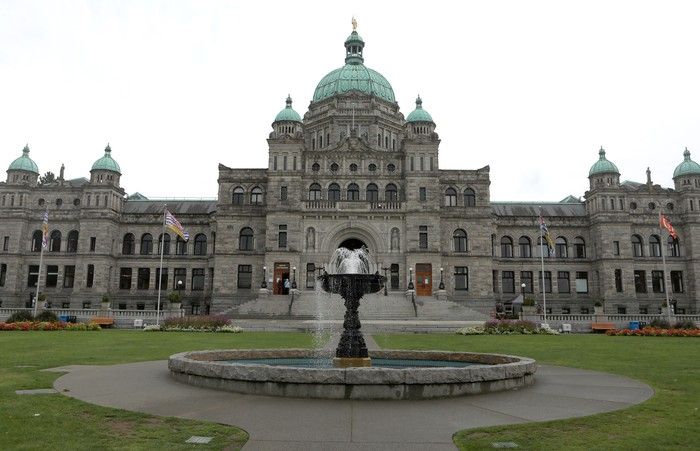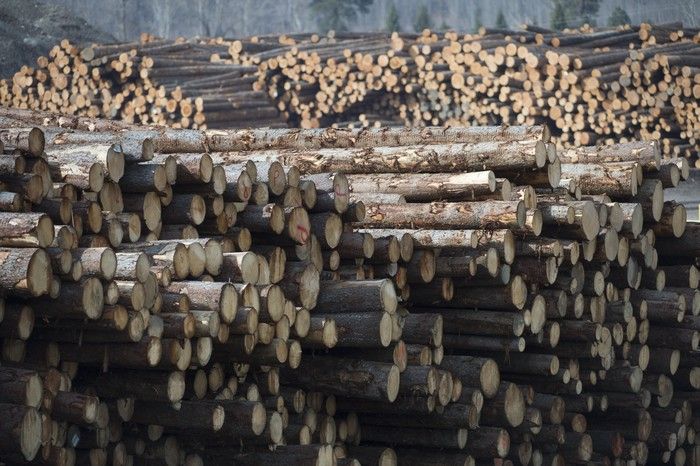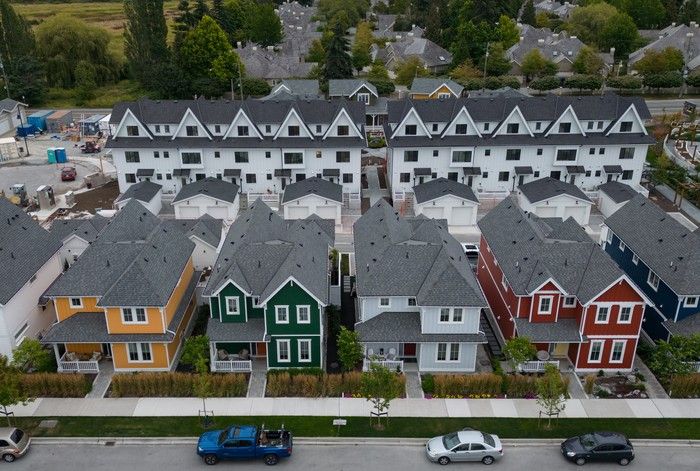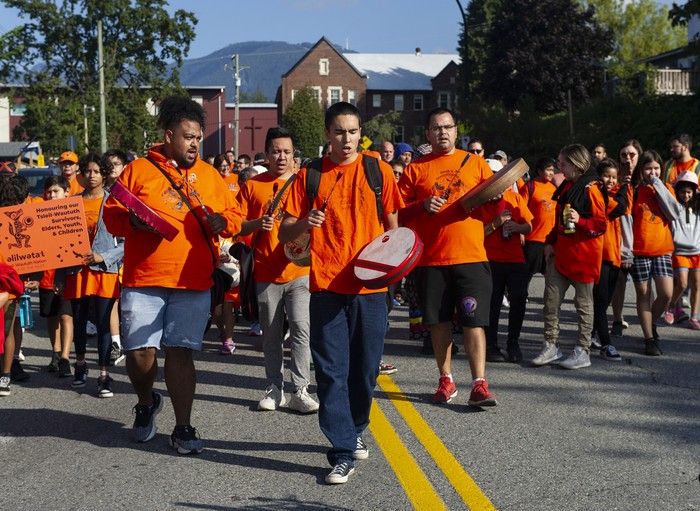B.C. business organizations sent a survey on economic policies — from wage growth to deficits to the cost of living — to the leaders of B.C.’s three major political parties. Here are their responses

Twenty-three B.C. business and trades organizations sent a survey on economic policies to the leaders of B.C.’s three major political parties. Below are their responses:

Productivity, business investment and wage growth
How would your government encourage more business investment, job creation and higher wages in British Columbia?
NDP: B.C.’s direct capital investment is 90 per cent higher compared to when John Rustad was in government with the B.C. Liberals, and the NDP will do more to boost investment and provide high-paying jobs. We will expedite permit processes for our rapidly growing mining and natural resources sector, drive key manufacturing investments like the Vitalus dairy plant, and build the housing we need so our life sciences and tech sectors can attract and retain key talent.
Conservatives: A Conservative government will cut taxes and reduce regulatory burdens to stimulate business investment and job creation. By promoting key industries such as LNG, mining and forestry, we’ll drive productivity and create more family-supporting jobs across B.C., while ensuring wages rise alongside economic growth.
Greens: Economists point to a consolidation of market power by fewer, larger players that are increasing dividends and share repurchases, rather than reinvesting. The B.C. Greens are focused on spreading that wealth in a more fair manner and reducing consolidation of market power — because more competition can drive better outcomes for businesses and people. We need to empower and support small and medium-sized businesses, and make sure people have the confidence to invest in themselves and their businesses.
Cost of doing business
How would you reduce the cost of doing business in the province?
NDP: The NDP reduced small business taxes and made sure 90 per cent of businesses do not pay the employer health tax. We know there’s more to do. We’ll take further action to cut red tape and costs, while ensuring high standards. Increased skills training will create opportunity while bringing down the cost of accessing key skills. And co-ordinating investments in national transportation networks with other provinces will help businesses with transportation costs — even if Ottawa isn’t stepping up.
Conservatives: The Conservatives will eliminate the carbon tax and unnecessary regulations that burden businesses. We will champion small business by encouraging and fostering entrepreneurship and promoting a dynamic and competitive economy. We will promote a competitive environment for business through a common-sense approach to regulation, and a review of unfair and uncompetitive B.C. NDP tax policies.
Greens: The B.C. Greens will create the conditions that business needs to thrive: regulatory certainty, a healthy and well-educated workforce, infrastructure and housing for all. Ensuring our taxation system is fair and our regulations achieve the outcomes we want as opposed to creating unnecessary burdens is important. We must move away from an economy based on fossil fuels. Our vision includes scaling up of the clean-energy sector, which would deliver reliable and affordable energy.
Spending and deficits
Does your government have a plan to balance the budget? And if so, how and when? How will you ensure provincial program spending provides the best value for the services British Columbians rely on?
NDP: B.C. is growing faster than ever, and an NDP government led by David Eby will build the schools, transit, roads, housing and hospitals people need. Despite having some of the strongest private-sector job creation in the country over the past year, people and businesses are struggling and need support. We will drive investment, grow the economy, and return to balance over time.
Conservatives : The Conservatives led by John Rustad are committed to improving the province’s fiscal position. This will be achieved responsibly through measured, common sense steps — specifically by implementing a spending review and reducing wasteful expenditures. Our focus will be on efficient delivery of essential services, including health care and education, to ensure maximum value for taxpayers while curbing unnecessary expenditure.
Greens: Our health-care system is unable to provide care, our schools are crumbling and our social safety net resembles a high wire. Our concern as B.C. Greens is not with the deficit, but with spending so much while not delivering infrastructure and services we need. Sonia Furstenau is pleased to see growth in service industries as a sign that we can transition from a raw materials economy to one based on clean, green technology and services.
Climate and energy policy
How will your government balance environmental goals with keeping life affordable and the economy growing? What are your plans regarding the carbon tax?
NDP: In the absence of a federal backstop, the NDP would cancel the carbon tax for people, while ensuring big polluters continue to pay. We have the fastest growing economy of any major province since 2017, in part due to our abundance of low-cost, low-carbon electricity. We’re embracing this advantage, with billions of dollars in private-sector investments already proposed in our recent call for clean power. Climate action is an economic opportunity if we seize it.
Conservatives: Conservatives will scrap the carbon tax and support affordable energy by expanding LNG and pipeline infrastructure. Our approach balances environmental stewardship with economic growth, using incentives for clean technologies without imposing burdensome costs on families or businesses. In certain areas such as the Northwest, we will make energy more affordable for families and businesses by reducing dependency on long and expensive power lines from the northeast and increasing local power generation.
Greens: The B.C. Greens see putting a price on pollution as necessary to ensure B.C. meets greenhouse-gas reduction goals while safeguarding our environment, our health, and diversifying our economy. We are committed to continuing with a carbon tax, but would amend it to ensure every tonne of emissions is treated equally. B.C. was a leader in implementing a price on pollution. Leaders understood that a carbon tax, paired with the right incentives, benefits our economy.
Resource development
Will your government prioritize resource development in B.C.? If so, what specific actions will you take?
NDP: New Democrats will absolutely continue to prioritize resource development. In just the past two years we’ve seen reopened mines, construction starting on new mines and $3 billion in energy projects. We’ve got so much more to do. We’ll speed up permit approvals while keeping standards high, support our growing hydrogen sector that saw over a billion dollars in new investment this year alone, and boost made-in-B.C. wood manufacturing to support good-paying forestry jobs.
Conservatives: A Conservative government will prioritize resource development. We support the responsible expansion of LNG, mining and forestry sectors, ensuring job creation, sustainable practices, and the protection of B.C.’s global leadership in clean resource production. We have recently released common sense plans to unlock the full potential of mining, forestry, and natural resources in B.C.
Greens: Greens believe B.C. has much more to offer than raw resources. We need to build a new narrative — one where we are building well-paid, secure jobs. Around two per cent of jobs in B.C. are connected to oil and gas extraction, mining and support industries and less than three per cent of our economic activity is derived from them. We will support workers to transition into clean energy. Our forests, if responsibly managed, can provide sustainable products and sustainable jobs.
Regulatory improvement
How will your government modernize regulations, speed up decision making, and improve regulatory outcomes?
NDP: Better, smarter regulations promote economic growth, innovation and local benefits. The NDP has reduced the permitting time for mining and housing while maintaining high standards. We will keep speeding up and streamlining permitting, establishing a “whole project” approach. The Mount Polley disaster and a recent collapse of tailings ponds in Yukon are a reminder that we must maintain high standards while driving investment and creating good jobs for B.C.
Conservatives: Conservatives will streamline regulations through a “one project, one permit” system, reducing approval times and cutting red tape. Our goal is to make B.C. the most business-friendly province in Canada, allowing businesses to thrive while maintaining necessary oversight for safety and environmental standards.
Greens: The B.C. Greens believe in legislating well — in making sure that we hear from people impacted by regulation before implementing it. We would open a bill for amendment once each term, not repeatedly. We believe in being transparent and publicly sharing the information and data that we’re basing our decisions on. Good regulation protects the environment and communities, and all regulations should be geared toward good outcomes rather than creating burdensome processes.
Crime and safety
What policy changes would you prioritize to improve public safety in B.C. communities?
NDP: The NDP is taking action to fight crime and keep people safe. We’re hiring over 250 police officers and launching specialized teams to go after gangs and drug trafficking. We’re bringing in new, secure care for people struggling with mental illness, addiction and brain injuries who are a risk to themselves or others. We’re pushing Ottawa to strengthen bail rules to keep repeat offenders in jail.
Conservatives: Conservatives will reverse drug decriminalization policies, appoint tough-on-crime judges, and direct prosecutors to pursue maximum sentences for repeat violent offenders. Additionally, we’ll increase funding for law enforcement and crack down on illegal activities that threaten community safety.
Greens: The statistics show a different story: Incidents per capita deceased between 2019 and 2023, and violent crimes per capita have been consistent. B.C. Greens hear from people, though, that they feel less safe. The special committee on reforming the police act released its report, Transforming Policing and Community Safety, in 2022. We would implement its recommendations so police have the resources and tools to do their jobs. The growing toll of homelessness needs to be solved with urgency.
Cost of living
If elected, how will your government make life more affordable for British Columbians? Will you cut taxes as part of your strategy?
NDP: New Democrats will follow through on our plan to remove barriers to building townhomes, duplexes and triplexes across B.C., and will use public land to build more affordable homes. We will keep car insurance and hydro rates low, ban tolls on bridges, and deliver affordable child care.
Conservatives: Conservatives will eliminate the carbon tax to bring down prices. We will increase housing supply through deregulation and faster approvals, helping stabilize prices and rents. We will implement policies that unlock our natural resource sector and deliver a low-tax and efficient regulatory environment for business. We will introduce the largest tax cut for renters and homeowners in B.C. history. Up to $3,000 per month of rent or mortgage interest costs will be exempt from provincial income taxes.
Greens: The Green housing plan is focused on investing in non-market housing and ending the financialization of housing. Without measures to stem the loss of existing affordable rental units, it will be nearly impossible to address the need for affordable units through new supply alone. On energy, we are concerned about the rise in prices when LNG comes online in B.C., exposing consumers to global energy prices. We would focus on improving our clean energy network.
Health care
What changes would you implement to improve health care?
NDP: We’re finally starting to turn the corner on health care, connecting 4,000 people to a family doctor every week. The NDP will keep hiring more doctors and nurses, opening a new medical school in Surrey, recognizing internationally credentialed doctors, empowering pharmacists and nurse practitioners, and building new hospitals. David Eby’s team won’t stop until the job is done.
Conservatives: Our “patients first” health-care model will expand access by incorporating both public and non-governmental delivery options. John Rustad and the Conservatives will reduce waiting times and deliver a waiting-time guarantee through patient-based funding, recruit more doctors and nurses, and reform outdated systems to ensure British Columbians receive timely, quality care.
Greens: The B.C. Greens have announced our plan for reforming primary care, to provide more British Columbians with access to longitudinal, team-based care. The Dogwood model would focus on bringing a community health centre to every riding in B.C., attracting doctors and nurse practitioners as lead carers in a team-based model. Getting primary care right and giving people an entry-point into the health system will relieve pressure on emergency rooms, and will keep British Columbians healthier.
Reconciliation
How will your government support economic reconciliation with Indigenous peoples in British Columbia?
NDP: The NDP believes partnership, not lawsuits, will save public money and create prosperity. We can see the benefits. The new KSM mine in the northwest with 1,800 construction jobs, the Blackwater mine with hundreds more, and a new housing development with 2,600 homes at 40 per cent below market value are examples of partnerships with First Nations make us all better off. We won’t play politics with such an important issue for business stability and our province’s future.
Conservatives: Economic reconciliation will be a key priority for a Conservative government. We will work in partnership with Indigenous communities to promote joint ventures in resource development, ensuring that Indigenous peoples have full participation and benefit from B.C.’s economic opportunities.
Greens: Sonia Furstenau and the B.C. Greens understand that the rights of Indigenous peoples are inherent, existing and cannot be infringed upon. First Nations hold rights and title to the land because it was never legally surrendered or ceded. Ignoring this reality is not only unjust but creates uncertainty and leads to costly, protracted litigation. We are focused on providing certainty over land, ensuring provincial legislation aligns with the Declaration on the Rights of Indigenous Peoples Act.








